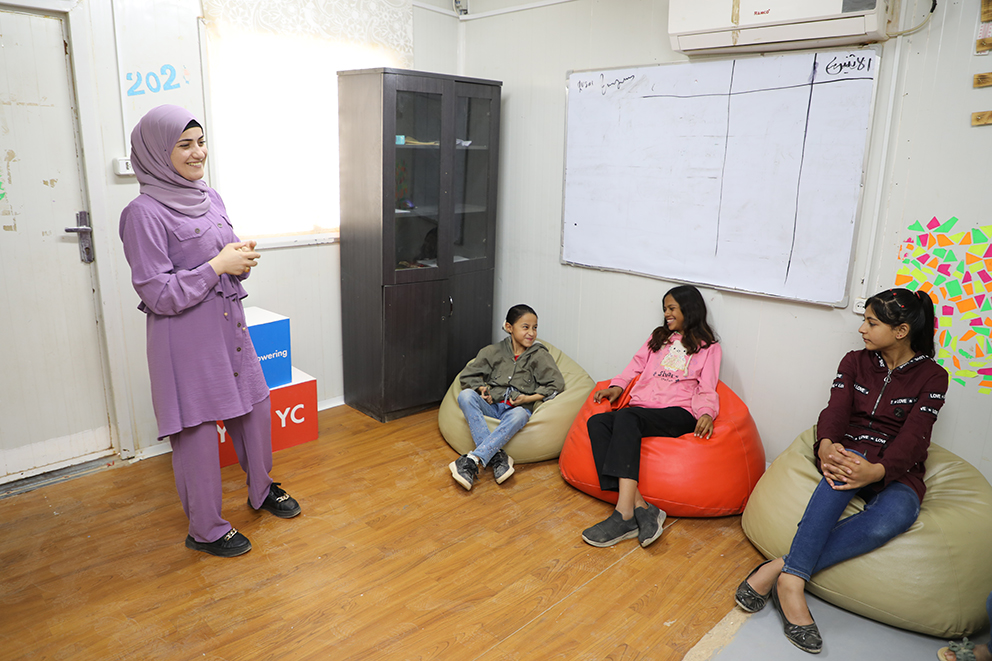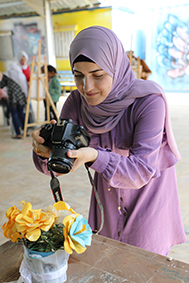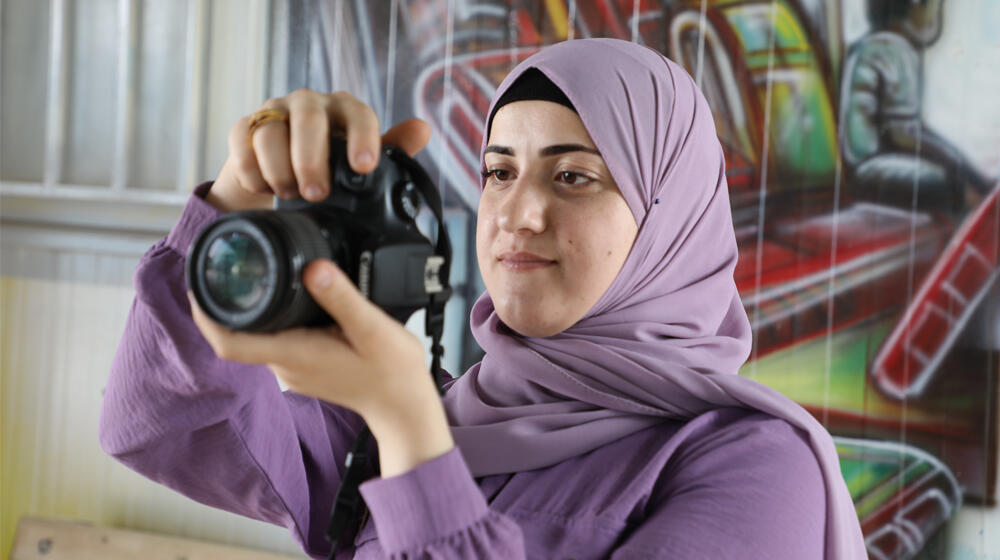Nour Mohammad embarked on a journey filled with challenges, resilience, and the pursuit of dreams. At just 12 years old, she, her parents, and four younger brothers left Syria as the crisis worsened and security deteriorated in their homeland. Nour, the eldest among her siblings, was about to face circumstances she could never have imagined.
"When we arrived at the Jordanian border in the early hours of dawn," Nour recalls, "all we could think of was rest after the suffering we had endured." Their arrival at the Zaatari camp for Syrian refugees came at eight in the morning, a moment of mixed emotions for Nour. "I was happy because I would reunite with my aunt, my closest friend," she says. "But sadness remained as I left my home behind."
Despite the hardships, Nour's unwavering love for learning drove her to pursue her education. In the second day, she enrolled in school, even though going to school in Zaatari camp was tough journey, especially during the harsh winter months when muddy roads made the trip challenging. She was determined to attend school, often waking early to buy breakfast for her family, helping her siblings prepare for school, and assisting her mother with household chores upon her return.
Yet, the pursuit of education was met with resistance from her mother, who believed household chores should take priority. Nour's books were torn on two occasions, and she was prevented from attending school. But her determination persevered, allowing her to continue her education and excel in her eighth grade.
After months in the Zaatari camp, they moved to the city of Ramtha, where Nour's father had secured employment. Despite her best efforts, Nour's pleas to enroll in school fell on deaf ears, as her mother feared for her safety.
However, fate had an unexpected twist for Nour. A woman visited their home one day, prompting her mother to ask her to dress appropriately. After seeing Nour, the guest made a surprising declaration: "You will become my daughter-in-law."
I was happy, because in my mind, marriage meant wearing a white wedding dress and makeup. Most importantly, I wanted to escape my family's home, where I felt like I was slowly fading under the heavy burdens.
Nour recalls that day with mixed emotions. "I was happy," she admits, "because in my mind, marriage meant wearing a white wedding dress and makeup. Most importantly, I wanted to escape my family's home, where I felt like I was slowly fading under the heavy burdens."
A few days later, the groom, a 19-year-old mechanic, visited. Although Nour was incredibly shy and couldn't even look at him, they were engaged. It was the beginning of a chapter that would shatter her life.
Marriage introduced Nour to a confusing reality, far from the dreams she had nurtured. "I woke up to another reality," she says, "a life I couldn't understand, filled with overwhelming responsibilities—responsibilities for a household, a husband, three sisters-in-law, a brother-in-law, and parents-in-law. I realized that no matter how difficult life had been in my parent’s home, it was still more merciful than this."

As the weight of the household fell on her shoulders, Nour began to feel like a servant in her new life. "I felt I had to obey everyone," she explains, "with no right to object, no opinion of my own. I had to carry out their orders to keep everyone pleased."
The pressure to have a child soon followed, persisting for three long years. During which, Nour's mother visited only every six months, unaware of her suffering. She chose to bear her torment in silence.
After enduring this torment for three years, her husband dropped a surprise—he married to a 17-year-old girl, almost her own age. Yet, this new addition to the family only complicated matters. The young bride sought divorce within six months, unable to endure living under the same roof as Nour.
Amid the chaos, her family had emigrated to America, leaving Nour isolated and alone. Her existence continued to be dominated by servitude to her husband's family.

Nour's life took another difficult turn when her husband traveled to work in the Emirates, leaving her with his family. She became a servant in her own home, bearing the brunt of all household responsibilities. The emotional strain was unbearable, leading her to think of attempting suicide. Tears became her only constant, her pillow a silent witness to her nightly torment, and she was forbidden from visiting anyone.
A year later, her husband called her and told her that he wants to marry another woman, and he presented her with a strange request—remain as a servant to him and his new wife or seek a divorce. Nour chose divorce, even if it meant homelessness, and she gave up her rights for her freedom.
After the divorce, the Nour was offered a place to stay by her uncle (her father’s brother), who lived in Amman. She found herself in a situation that felt harshly similar to her previous life with her husband, burdened by the societal constraints placed upon divorced women. Her existence remained confined within the walls of her uncle’s house, and venturing outside required his presence as an escort. During this period, she sought solace in therapy and met with a psychiatrist for three months. Countless sleepless nights were spent in tears as she grappled with the overwhelming sense of incompleteness stemming from her inability to bear children.
During that period, an overwhelming urge consumed me – the need to expose my true emotions to someone, to let my tears flow freely, to release repressed screams, and to convey the depths of my sadness and suffering. Yet, a reality remained: there was no one there to offer me solace or understanding.
After a year and a half had elapsed, Nour found the inner strength to embark on a life-changing journey. Overwhelmed by her challenging circumstances, she sought refuge with her married aunt in Irbid. Without hesitation, her aunt came to her aid, and Nour stayed with her for a week.
After her week with her aunt, Nour called her uncle, her mother's brother, residing in the Zaatari camp. With unwavering support, he welcomed her into his home along with his family. Under his nurturing guidance and support, Nour embarked on a transformative journey of self-discovery and empowerment.
Her cousin introduced her to the Quest Scope youth center, supported by the United Nations Population Fund, where Nour engaged in various events and activities. Training sessions raised her knowledge and confidence, paving the way for her to make a difference.
Volunteering became her sanctuary, and she eagerly grasped every opportunity to cultivate her skills and unleash her potential.
Nour participated in an array of training programs at the center, which significantly boosted her capabilities and honed her skills across various domains. These workshops covered subjects such as reproductive and sexual health, as well as gender-based violence. Through these transformative training sessions, her self-esteem grew.
These valuable lessons enlightened her about women's potential to take the lead in driving change and escaping the customs and traditions that had previously ensnared her in early marriage. The profound impact of these training sessions reshaped Nour's entire character. Nour remarked, "I wish my parents had received this training before my marriage. I am confident they would have hesitated had they been aware of the risks, challenges, and obstacles associated with early marriage."
I wish my parents had received this training before my marriage. I am confident they would have hesitated had they been aware of the risks, challenges, and obstacles associated with early marriage.
This marked the beginning of her new journey, as Nour also signed up for a training on photography, photo editing, and film making. “Photography captured my heart, becoming my newfound passion. It reinforced my self-confidence and provided me with a fresh perspective on life, shedding light on the plight of girls forced into early marriages.” Said Nour. I felt profound empathy for them, knowing that regret would follow. I emerged stronger, eagerly advocating for women's rights, my camera lens trained on issues affecting women lives to raise awareness about challenges facing them in the camp.” She added.
Today, Nour stands fully equipped with skills and expertise in her beloved profession: photography, which she affectionately refers to as 'alternative angle.' At the age of 24, she is actively making a difference and driving change. She has become her own unwavering advocate, extending her counsel and encouragement to every girl and every parent, urging them to reject early marriage. She encourages every young woman to strive relentlessly toward their dreams, reminding them that achieving those dreams is within reach, as nothing can stop the power of free will. To those who find themselves without support during trying times, Nour champions the idea that they can be their own pillars of strength and defy the world to pursue their aspirations.
"I made a promise to myself," Nour declares, "that I would give full attention to my dreams, change my life with my own hands, and be responsible for my future. I decided to develop my abilities and skills."
With her unwavering determination, Nour is a living testament to the resilience of the human spirit, proving that even in the face of adversity, one can create a brighter future and challenge the world for what they dream of.


